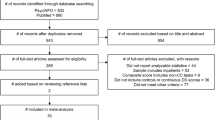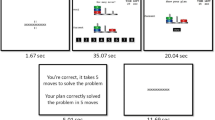Abstract
Concepts of cognition as causal entities, fundamentally antecedent to other psychological processes, are criticized. It is argued that such conceptions involve a loss of a sense of the complex appraisal processes encompassed in cognition, the generation of pseudoissues about the causal priority of cognition, and a tendency to detach persons being studied from their environment in a way that loses them in thought. In light of this analysis, the role of cognition in depression is discussed. An adequate model of depressive cognitions is not possible without an understanding of the depressed person's ecological niche and the informational consequences of depressive behavior. Cognitive theorists need to come to terms with the apparent receptivity of depressed persons to performance-based feedback.
Similar content being viewed by others
References
Alloy, L. B., & Abramson, L. Y. Judgment of contingency in depressed and nondepressed students: Sadder but wiser?Journal of Experimental Psychology: General 1979,108 441–485.
Bandura, A. Self-efficacy: Toward a unifying theory of behavioral change.Psychological Review 1977,84 191–215.
Bateson, G. The cybernetics of self: A theory of alcoholism.Psychiatry 1971,34 1–17.
Beck, A. T., & Rush, A. J. Cognitive approaches to depression and suicide. In G. Serbin (Ed.),Cognitive defects in the development of mental illness. New York: Brunner/Mazel, 1978.
Beck, A. T., Rush, A. J., Shaw, B. F., & Emery, G.Cognitive therapy of depression: A treatment manual. New York; Guilford, 1979.
Bootzin, R., Herman, C., & Nicassio, P. The power of suggestion: Another examination of misattribution and insomnia.Journal of Personality and Social Psychology 1976,34 673–679.
Buchwald, A. M., Struck, S., & Coyne, T. C. Demand Characteristics and the Velten Procedure,Journal of Abnormal Psychology 1981,49 478–479.
Chambliss, C., & Murray, E. J. Cognitive procedures for smoking reduction: Symptom attribution versus efficacy attribution.Cognitive Therapy and Research 1979,3 91–95.
Coulter, J.The social construction of mind. London: Macmillan, 1979.
Coyne, J. C. Depression and the response of others.Journal of Abnormal Psychology 1976,85 186–193. (a)
Coyne, J. C. Toward an interactional description of depression.Psychiatry 1976,39 28–40. (b).
Coyne, J. C., & Lazarus, R. S. Cognition, stress and coping: A transactional perspective. In I. L. Kutash & L. B. Schlesinger (Eds.),Handbook on stress andanxiety. San Francisco: Jossey-Bass, 1980.
Craighead, L. W., & Craighead, W. E. Implications of persuasive communications research for the modification of self-statements.Cognitive Therapy and Research 1980,4 117–135.
Dewey, J., & Bentley, A. F.Knowing and the known. Boston: Beacon, 1949.
Ellis, A. Rational-emotive therapy: Research data that supports the clinical and personality hypotheses of RET and other modes of cognitive-behavior therapy.Counseling Psychologist 1977,7 2–46.
Isen, A., Shalken, T., Clark, M., & Karp, L. Affect, accessibility of material in memory and behavior: A cognitive loop?Journal of Personality and Social Psychology 1978,36 1–12.
Kellog, R., & Baron, R. S. Attribution theory, insomnia, and the reverse placebo effect: A reversal of Storms and Nisbett's findings.Journal of Personality and Social Psychology 1975,32 231–236.
Lazarus, R. S., Coyne, J. C., & Folkman, S. Cognition, emotion and motivation: The doctoring of Humpty-Dumpty. In R. J. Neufeld (Ed.),Psychological stress and psychopathology. New York: McGraw-Hill, in press.
Lewinsohn, P. M., Mischel, W., Chaplin, W., & Barton, R. Social competence and depression: The role of illusory self-perceptions.Journal of Abnormal Psychology 1980,89 203–212.
Mahoney, M. J., & Arnkoff, D. Cognitive and self-control therapies. In S. L. Garfield & A. E. Bergin (Eds.),Handbook of psychotherapy and behavior change: An empirical analysis. New York: Wiley, 1978.
Mahoney, M. J., & Kazdin, A. E. Cognitive behavior modification: Misconceptions and premature evacuation.Psychological Bulletin 1979,86 1044–1049.
Mancuso, J. C. Current motivational models in the elaboration of personal construct theory. In A. W. Landfield (Ed.),Nebraska symposium on motivation: Personal construct psychology. Lincoln: University of Nebraska Press, 1977.
Mancuso, J. C., & Ceely, S. G. The self as memory processing.Cognitive Therapy and Research 1980,4 1–25.
Miller, W. Psychological deficit in depression.Psychological Bulletin 1975,82 238–260.
Rush, A. J., Beck, A. T., Kovacs, M., & Hollon, S. Comparative efficacy of cognitive therapy and imipramine in the treatment of depressed patients.Cognitive Therapy and Research 1977,1 17–37.
Ryle, G.The concept of mind. London: Hutchinson, 1949.
Shaw, R., & Bransford, J.Perceiving, acting, and knowing: Toward an ecological psychology. Hillsdale, New Jersey: Erlbaum, 1977. (a)
Shaw, R., & Bransford, J. Introduction: Psychological approaches to the problem of knowledge. In R. Shaw & J. Bransford (Eds.),Perceiving, acting, and knowing: Toward an ecological psychology. Hillsdale, New Jersey: Erlbaum, 1977. (b)
Singerman, K., Borkovec, T., & Baron, R. Failure of a misattribution therapy manipulation to reduce speech anxiety.Behavior Therapy 1976,7 306–313.
Velten, E. A laboratory task for induction of mood states.Behaviour Research and Therapy 1968,6 473–482.
Weimer, W. B. A conceptual framework for cognitive psychology: Motor theories of mind. In R. Shaw & J. Bransford (Eds.),Perceiving, acting, and knowing: Toward an ecological psychology. Hillsdale, New Jersey: Erlbaum, 1977.
Weimer, W. B., & Palermo, D. S. (Eds.).Cognition and the symbolic processes. Hillsdale, New Jersey: Erlbaum, 1974.
Weissman, M. M., & Paykel, E. S.The depressed woman. Chicago: University of Chicago Press, 1974.
Wittgenstein, L.The blue and brown books. New York: Harper, 1965.
Author information
Authors and Affiliations
Additional information
Writing of this paper was supported in part by a research grant from the National Institute on Aging (AG 00799) and a National Institutes of Health Biomedical Research Grant (PR-0706). Special thanks to Ken Holroyd for his comments on an earlier draft, and thanks also to the angry anonymous reviewer who nonetheless had a positive impact on this paper's final form.
Rights and permissions
About this article
Cite this article
Coyne, J.C. A critique of cognitions as causal entities with particular reference to depression. Cogn Ther Res 6, 3–13 (1982). https://doi.org/10.1007/BF01185722
Issue Date:
DOI: https://doi.org/10.1007/BF01185722




